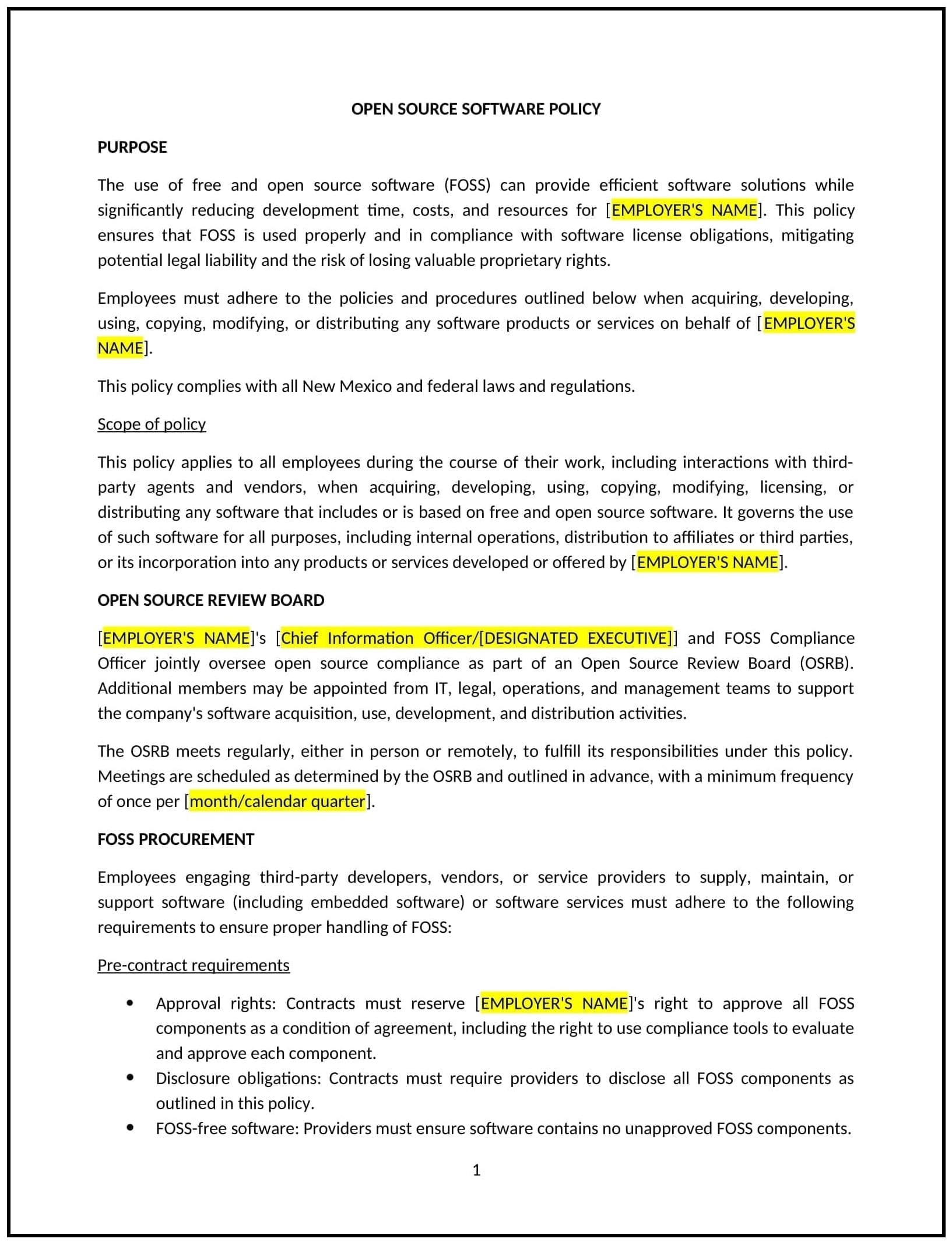Open source software policy (New Mexico): Free template
Got contracts to review? While you're here for policies, let Cobrief make contract review effortless—start your free review now.

Customize this template for free
Open source software policy (New Mexico)
This open source software policy is designed to guide New Mexico businesses in the proper use, contribution to, and distribution of open source software. The policy outlines how employees can use open source software in their work, the process for evaluating open source licenses, and the company’s expectations for contributing to or distributing open source projects.
By adopting this policy, New Mexico businesses can ensure that they use open source software responsibly, protect their intellectual property, and contribute to the open source community in a way that aligns with business goals and legal obligations.
How to use this open source software policy (New Mexico)
- Define open source software: Clearly define what constitutes open source software and include examples of common open source licenses, such as the GNU General Public License (GPL) or Apache License.
- Establish guidelines for use: Outline how open source software can be used within the company, including whether employees are allowed to integrate open source software into company products or services, and what type of software is approved for use.
- Evaluate open source licenses: Provide guidance on how to evaluate the terms of open source licenses. Employees should understand the obligations tied to using or contributing to open source projects, including ensuring compliance with license terms, such as attribution or redistribution requirements.
- Set contribution policies: Specify whether and how employees can contribute to open source projects. The policy should include guidelines on protecting company intellectual property, ensuring that contributions do not conflict with business interests, and following proper channels for contributions.
- Reflect New Mexico-specific considerations: Address any state-specific regulations or best practices that may apply to open source software usage, including how open source projects may affect business practices, government contracts, or industry standards in New Mexico.
Benefits of using this open source software policy (New Mexico)
Implementing this policy provides New Mexico businesses with several advantages:
- Reduces legal risks: A clear policy helps businesses avoid legal complications by ensuring that open source software is used in compliance with applicable licenses and by protecting the company from inadvertent intellectual property violations.
- Promotes innovation: By contributing to and using open source software, businesses can access a wider range of tools, collaborate with external developers, and foster innovation within their product or service offerings.
- Enhances community engagement: Contributing to open source projects can improve the company’s reputation within the developer community and foster a culture of collaboration, learning, and knowledge sharing.
- Protects intellectual property: Clear guidelines help businesses safeguard their proprietary software and data by establishing boundaries for what can be shared or contributed to open source projects.
- Encourages efficient use of resources: Using open source software can reduce development costs, as businesses can leverage existing solutions rather than creating software from scratch, leading to faster time-to-market and lower overhead.
Tips for using this open source software policy (New Mexico)
- Communicate the policy effectively: Ensure all employees understand the open source software policy and are aware of the guidelines for using and contributing to open source projects. The policy should be included in the employee handbook and reviewed during onboarding.
- Monitor usage and contributions: Regularly review and track the use of open source software within the company, as well as any contributions made by employees. Ensure that contributions align with company interests and protect intellectual property.
- Provide resources for evaluating open source software: Offer training or tools to help employees assess the terms and conditions of open source licenses. This can help prevent misunderstandings or misapplications of licensing terms.
- Collaborate with legal counsel: Work closely with legal teams to ensure that any open source contributions are reviewed and vetted for compliance with company policies, intellectual property protections, and licensing agreements.
- Stay updated on open source trends: Regularly review industry trends and new open source licenses to ensure that the policy remains up-to-date and relevant. Open source practices evolve, and businesses should stay informed about new software and licensing models.